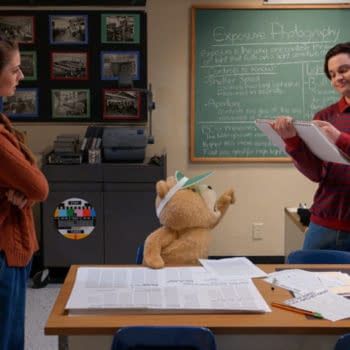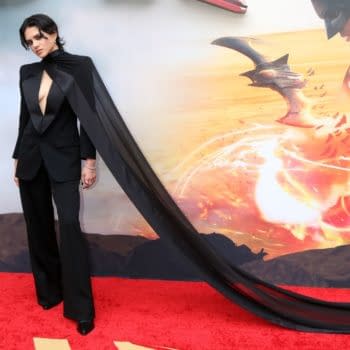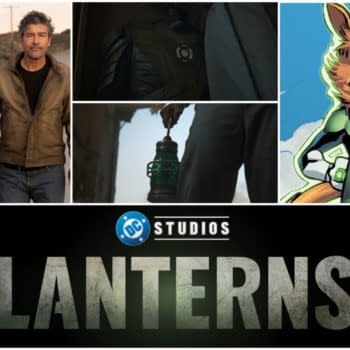Posted in: Movies, Recent Updates | Tagged: a fantastic fear of everything, chris hopewell, crispian mills, simon pegg
Directors Crispian Mills And Chris Hopewell
Our review won't be out until tomorrow, but let me tell you this: A Fantastic Fear Of Everything is a weird movie. It has everything from Victorian killers to insecure hedgehogs, so when I was offered the opportunity to speak to writer-director Crispian Mills and co-director Chris Hopewell, my main goal was to find out just what this film was and where it had come from.
A Fantastic Fear of Everything is about a writer called Jack (Simon Pegg), once a children's author and now attempting a more serious oeuvre of plays for television called Decades of Death: a series based on the lives and deaths of Victorian serial killers. Unfortunately, Jack's research has left him crippled with a pathological fear of being murdered, and he spends most of his days and nights running around his cluttered apartment clutching a carving knife and jumping at shadows, passing carol singers, and community support officers. To make matters worse, he has an important meeting with a Hollywood producer, and no clean pants or shirts left due to his irrational fear of launderettes.
Bleeding Cool: The film seems to be primarily a comedy, but during the screening there were a lot of moments that made the audience jump. Would you say it's also partially a horror movie?
Crispian Mills: No, I wouldn't say it's any kind of genre, necessarily … The best term we could come up with was "the psycho-comedy". It was really defined by Simon Pegg and his performance, which holds the whole thing together.
BC: There's a lovely stop-motion animation near the end of the film when Jack is telling the story of two hedgehogs. Tell me a bit about the creative process behind that.
Chris Hopewell: We talked about this for quite some time, and we decided that we would try to get as much of the characters of Perkins and Jack into these puppets, so the little hedgehog characters mirrored the onscreen characters. We spent a few months last year designing them with a team of people in Bristol. We kind of built them in a really old school way; they were made out of balsa wood and bits of fluff and wax string. Anything that someone like Oliver Postgate, who did Bagpuss and The Clangers, anything that he might have used. I put a Postgate post-it on the wall saying, "What would Postgate do?" when we were designing them.
CM: He built them in his garden shed, didn't he?
CH: He did, yeah, his wife knitted the Clangers. We wanted to have that kind of naïveté, I think it's really important in the story telling that there is this really strong feeling of nostalgia.
BC: Do you think a lot of children's stories contain adult themes?
CM: Yes, in all the good ones. In all the good stories, the stories that you remember.
BC: Is that what Jack's doing, when he writes his children's story books or Decades of Death?
CM: His problems all stem from the fact that he doesn't want to work through his trauma, he can't face it. It's been well-documented by people like Joseph Campbell and anthropological writers who show you that the nature of myth and fairy tales often deal with aspects of our formative experiences in life. There's a little bit of that going on in the film as well.
BC: Was it difficult to get funding for – and then market – such an odd film?
CH: When I first started reading what Crispian was putting together, the first word I used was "Odd." To me it's a good word, to be the odd one out is a good thing in life.
CM: It was difficult, but when you go around trying to talk to people about making a film, and eventually finding people who get it, then you just need more people who get it. It's very heartening, meeting people who share your sense of humour, or who see potential and are excited by it.
CH: I'm surprised we actually got to make it, to be honest!
BC: Fantastic Fear has a pretty eclectic soundtrack. How and why did you choose the songs that are in the film?
CM: All the tracks compliment each other, and it's good to have music that stems from the story, and lyrically compliments what's happening. There's no gratuitous use of tracks, they all serve a purpose in the storytelling. It's good to have your cake and eat it, you can have a moment when the music kicks the gears and the excitement and atmosphere, but if it adds to the storytelling and the character … there's a couple of times when that was very satisfying.
BC: So what is it about gangster rap that Jack finds so empowering?
CM: [Laughs] I just thought it was really funny that this really white guy, who was so English and so not badass … You imagine that when he was a teenager he would have found some kind of expression fo his masculinity and his manhood in gangster rap, because he's an orphan.
BC: Are the Victorian serial killers mentioned in the film based on true stories?
CM: The Hendon Ogre is real. There's some crazy stuff; when he says Victorian Britain was the golden age of serial killers, in a way it's true, because the press was just starting to create this sensationalist aspect, and who was fucking who and killing their wife and going off with their mistress was a great story. People couldn't get enough of sex and death and adultery, and the press would come up with these crazy names like the Hendon Ogre, who was killing his lodgers with the arsenic from flypapers. It's ingenious.
BC: What's with all the eyes?
CM: [Laughs] I don't know! I haven't sort of analysed it. God knows what I was thinking. I do know that the actor who plays Doctor Friedkin, and one of the other characters – who I won't name for spoiler reasons – they both went to see a friend of mine, a psychotherapist, so they did go and have a couple of sessions just to base their characters on some reality. She did come to the cast and crew screening but she left very quickly! [Laughs] She said she liked it, but I don't know what her analytical reading of it was. I'll have to ask her.
BC: Do you have any irrational fears of your own? Is that where the film comes from?
CM: There's an old saying that you're either driven by love or driven by fear. People will follow orders either because they love somebody or if they're frightened of them, and I think the world kind of works like that. So that's the story, of Jack trying to move away from fear and do things because he loves them. I think everybody's battling with that a bit, and trying to do things for the right reasons.
BC: How long was the film in development before it was made?
CM: We'd been chatting about it for about three years before we shot it.
BC: Was it always this incarnation, or did the story change during the writing process?
CM: It was always a guy in his apartment who was writing Decades of Death – crime plays about serial killers – who has to go to the launderette and has an irrational fear of launderettes. But it expanded over the years and we expanded it as a gang, with Chris and Simon, and we played to our strengths to see which way the film would go.
BC: The flat and the launderette are the two main locations, and Jack's flat is extremely cluttered. Are there a lot of objects in there that you might miss on a first viewing?
CH: Oh there's loads, yeah! That was one of the great things, personally for me, being the production designer and having talked with Crispian for three years, just laughing and saying, "Oh yeah, this should be in there, that should be in there, this has got to be in there." So while we were building the character and Crispian was writing the script, more layers were being added to the flat. What was enjoyable for me was that we then didn't have to try and translate this to the production designer, you could then just go in and go, "No, I know where it goes: this goes there, that goes there, this would go on there, Jack wouldn't have that, he'd have this." The flat itself has it's own character because of that.
BC: Do either of you have a favourite sequence or moment in the film?
CM: It's definitely a film that benefits from a second viewing, or even a third viewing, because there's quite a lot of layers there. When I watch it recently, having finally finished it, I tend to appreciate loads of things. But to be honest it's all held together by simon pegg and his performance. I love Chris' animation.
CH: [Laughs] I love the opening sequence of Jack just rattling around in this big old flat. That's my favourite part of it. It's great to see Simon hold the stage and hold his own for twenty odd minutes and just do his thing, and with the narration and his on-set acting as well just build the part and begin to tell the story.
A Fantastic Fear Of Everything is out in UK cinemas from Friday 8th June and you can check out the trailer below.
[youtube]http://www.youtube.com/watch?v=LQ1CGSMoqfo[/youtube]















